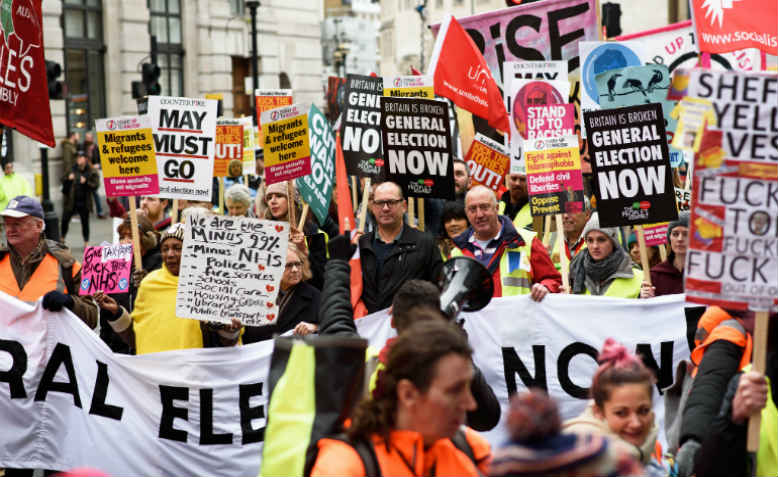 Britain is Broken - General Election Now!, London, 12.1.18. Photo: Jim Aindow
Britain is Broken - General Election Now!, London, 12.1.18. Photo: Jim Aindow
As protests across Europe are generalising, UK activists must seize the time, writes Dragan Plavšić
Last year ended with a bang not a whimper. December was truly a month of protests. Not quite an uprising, but close, for what Europe witnessed was a wave of mass resistance against neoliberal austerity.
It all started in France when President Macron announced a hike in petrol prices directly hitting the already threadbare pockets of millions of workers. His excuse was the need to combat global warming. Fine, but why not make corporations pay, not people who can’t?
The reaction was instantaneous. Weekend after weekend, the Yellow Vests poured onto the streets of Paris and other cities. As opinion polls confirmed, they now spoke for the nation, not Macron.
Then it was the turn of French high school students to protest against Macron’s Thatcherite plans for university education. One observer called them “the children of the Yellow Vests”. The students closed down 300 schools with 700 arrested, some as young as 12.
Despite a major show of state force – where even the police began to show sympathy with the protestors – nothing could hide Macron’s plummeting authority. He had to U-turn or risk a real uprising. Desperate to take the sting out of the protests, he not only withdrew the petrol price hike but promised the minimum wage increase and tax concessions also demanded by the protesters.
Macron’s humiliating climbdown was a stunning victory for the Yellow Vests. They have provided an object lesson in what mass protest can achieve. The first round in this struggle is theirs. More protests already this month show they’re ready for the next round.
Protests always spread quickly when the conditions are ripe. And the example of the Yellow Vests struck an instant chord with many beyond France’s borders.
In Hungary, when the authoritarian Orbán government passed the so-called ‘slave law’ almost doubling the amount of overtime employers could make workers work, days of spontaneous protests followed. Orbán dismissed them as “hysterical shouting”, but there’s already been a 10,000 strong protest this month. If the protests carry on like this, there’s a good chance Orbán could go the way of Macron.
In Albania, when the Rama government announced a hike in exam fees, students embarked on days of mass protests, rapidly becoming the voice of a whole nation groaning under neoliberal austerity. The government was forced into a U-turn and into a crisis that has seen seven ministers sacked.
In Serbia, tens of thousands have been marching to protest against authoritarian rule after an opposition leader was attacked by thugs. Another protest has already taken place this month too.
Smaller protests also took place in Belgium, the Netherlands, Portugal, Bosnia and Catalonia, picking up on other local issues along the way.
What conclusions can we draw from these protests for the year ahead?
First, that millions across Europe have well and truly had enough of the authoritarian austerity of the last ten years. And second, that millions are seeing through the neoliberal policies that gave rise to austerity in the first place. The fact is, a sea-change in the mood of millions is taking place, born of the bitter taste of neoliberal austerity.
This is the core fact our ruling classes refuse to face. Dogmatically wedded to neoliberalism, they either remain oblivious to the shifting mood or hope somehow to ride it out. Macron’s very special difficulty is that he wants to impose neoliberalism on France just as people everywhere are turning against it.
At root, then, this is a struggle between classes, between workers and students on one side who want to end neoliberal austerity and rulers on the other who want to intensify it. Something will have to give, but in whose favour? That depends on what people do, including here in Britain.
If Corbyn is to undo the terrible damage of 40 years of neoliberalism, his leadership of the Labour Party simply won’t be enough. The establishment ranged against him will be too strong. To overcome it, he will need the kind of support that only a mass protest movement can provide. 2019 could be a turning-point in Britain and across Europe. But only if we play to our strengths. December has just reminded us what they are.

